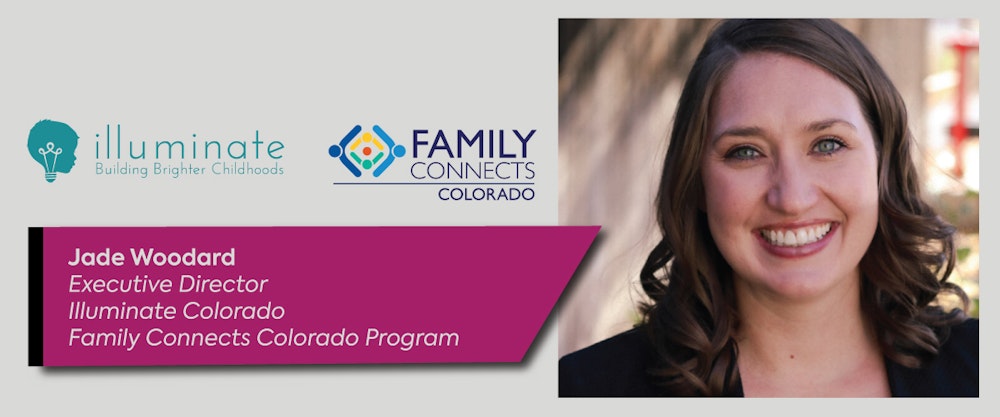
HOME VISITS THAT CONNECT MOMS AND FAMILIES TO LIFE-CHANGING SERVICES WHEN THEY NEED IT MOST.
Jade Woodard
Executive Director
Illuminate Colorado
Family Connects Colorado Program
Family Connects Colorado is a successful, evidence-based model and program that connects parents of newborns to the community resources they need through postpartum nurse home visits. Currently serving Eagle and Boulder Counties, the visits are available to all moms in these areas, with no eligibility requirements. That means moms and newborns in a variety of family situations can be assured one to three home visits by a nurse.
Jade Woodard, Executive Director of Illuminate Colorado, the intermediary organization leading the implementation of Family Connects Colorado, explained they can visit families or single caregivers who are biological parents, in adoptive kinship, foster families, same sex families, and immigrant or refugee families. “There are truly no bounds to who we care for,” Jade said. “If a baby is in a foster or kinship situation and placed separate from mom, both mom and baby can still benefit and have separate visits because there are both maternal and infant components.” She further explained that even if a baby is in foster care, mom can have a visit from Family Connects nurses to check on her postpartum experience and well-being. “It’s a beautiful, flexible model,” Jade said. “It is designed to be a resource and then a referral for additional long-term or intensive services if needed.”
Family Connects nurses are trained in clinical assessments and indicators, but they also go through trauma-informed training and referral and community alignment training to know what is available in the community and how to refer to those resources. They can help connect moms to childcare, other home visitation programs, treatment programs, food resources and more. “These are all things that help families get more solid footing in these early weeks,” Jade said. “Plus, our nurses quickly build meaningful relationships based on safe and non-judgmental communication. That enables families to be honest and really get the help and connections they need so that they can be stable, and hopefully not have child welfare involved.”
During their visits, Family Connects nurses do universal standardized screenings for substance use, mental health, intimate partner violence, family economic security or other social determinants of health screenings. “They are standardized tools but it doesn't feel like you're just sitting down with a checklist,” Jade explained. “It really feels like a compassionate, comprehensive conversation of what's going on with you and your family and what it's like bringing home this new baby. But, embedded within that, there are standardized screening tools.”
“When it comes to moms dealing with substance use, one of the things that is different about our services is that it is open to all moms. After all, learning what you need for a new baby is universal to all families,” Jade said. “So, there's something super normalizing and destigmatizing about meeting with our nurses. It feels like a safe connection, no matter your situation. For moms who are feeling the despair of having lost custody of their baby, this can be a really powerful moment of connecting with the nurse to identify treatment providers, support groups, and other resources.”
All Family Connects visits generally take place between three and five weeks postpartum, in the time period between discharge from the hospital and six-week postpartum visit, and in between well visits for babies. Jade explained, “Three to four weeks is really when you start to see the highest rates of postpartum maternal mental health disorders or perinatal mental health needs. So, we are dedicated to being there for them when other support may have dropped off but they aren’t scheduled for other health care visits yet.”
Ideally, by the time a person is having their baby at a hospital or birthing center, they will have heard about Family Connects through prenatal care, birthing classes, hospital tours or pediatrician visits. hen a visit from a Family Connects nurse is scheduled as part of discharge planning. Families can also self-refer if they have an at-home birth or don’t get scheduled through health care providers.
Family Connects began out of Duke University and the model shows that the infrastructure component is just as critical, if not more so, than the actual home visit itself. When families get a coordinated entry and “warm handoffs” to other resources, the program has shown exceptional outcomes including an increase in community connectedness, decrease in reported maternal depression and anxiety, decreases in child welfare involvement, and decreases in medical system utilization.
Note to Providers:
Our hope is that anyone who works with pregnant women or new parents would be referring to this program if it is where you practice. This should become the standard of care for all families upon the arrival of a baby. Denver and Jefferson County are the next two counties slated to come on board with Family Connects in spring of 2023. If you are interested in bringing Family Connects to your community, go to www.familyconnectscolorado.org, to complete the interest form on the About page and they will follow up with you.
Watch theFamily Connects video here: https://youtu.be/TwtfZRmhd38
Download the program brochure.
Share this article:





